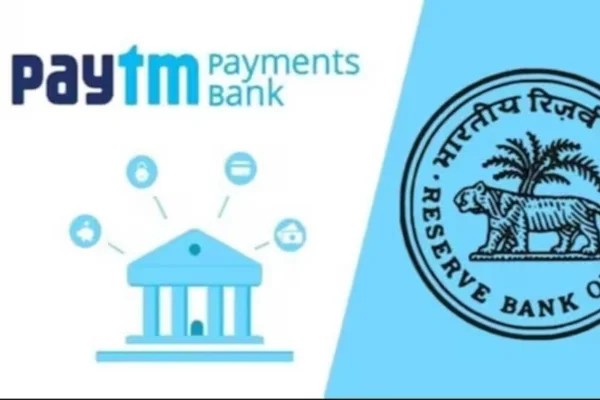Paytm Payments Bank has been barred by the Reserve Bank of India (RBI) from offering core services, including accounts and wallets.
Details of the imposed restrictions on Payment Bank:
- The Reserve Bank of India (RBI) directed a Payment Banks to stop deposits credit transactions or top-ups in any customer accounts, prepaid instruments, wallets, FASTag, etc.
- This is not a license cancellation but limits the bank’s operations due to persistent non-compliances and material supervisory concerns.
- Customers can withdraw or utilize balances without restrictions up to their available balance in various instruments.
- Fund transfers, Bharat Bill Payment Operating Unit (BBPOU), and Unified Payment Interface (UPI) facilities were also restricted.
- RBI directed it to terminate nodal accounts and settle pipeline transactions initiated on or before February 29, 2024.
- It was earlier asked to stop onboarding new customers and appoint an audit firm for a comprehensive System Audit.
Powers of the RBI:
- RBI can exercise its powers under section 35A of the Banking Regulation Act of 1949.
- RBI has broad powers to issue direction in the public interest or the interest of banking policy under the act.
- It can take action due to persistent non-compliance observed by external auditors and material supervisory issues.
- It can revoke the PPI (pre-paid instrument) license of the bank.
- Impact of restrictions: Annual EBITDA (earnings before interest, tax, depreciation and amortization), revenue, and profitability in medium to long-term.
Concerns of RBI:
- RBI’s action may stem from concerns related to KYC (Know your Customer) compliance, IT issues, and lack of information barriers within the group.
- A Chinese entity, holds a stake in the promoter company, drawing regulatory scrutiny amid India-China relations.
About Payments Bank:
- Payments banks are financial institutions, similar to traditional banks, but operating on a smaller scale without involving any credit risk.
- They were established under the Companies Act, 2013, based on Nachiket Mor Committee recommendations in 2014.
- Payment banks focus on financial inclusion with minimal credit risk.
- Such banks aredifferentiated and smaller-scale banks with a minimum capital requirement.
- They have limited activities like deposit-taking, personal payments, and cross-border remittances.
- This would enhance rural banking, financial inclusion, and an efficient alternative to traditional banks.
- Certain challenges are faced by limited awareness, insufficient incentives for agents, technological and infrastructure gaps that hinder adoption and functionality.
Ref: Source
| UPSC IAS Preparation Resources | |
| Current Affairs Analysis | Topperspedia |
| GS Shots | Simply Explained |
| Daily Flash Cards | Daily Quiz |
Frequently Asked Questions (FAQs):
What restrictions has the RBI imposed on Paytm Payments Bank?
The RBI has directed Paytm Payments Bank to stop deposit credit transactions, top-ups in customer accounts, prepaid instruments, wallets, and FASTag. It also restricted fund transfers, Bharat Bill Payment Operating Unit (BBPOU), and Unified Payment Interface (UPI) facilities.
Why did the RBI take action against Paytm Payments Bank?
The RBI took action due to persistent non-compliances and material supervisory concerns, which include KYC compliance issues, IT problems, and regulatory scrutiny due to a Chinese entity holding a stake in the promoter company.
What are the powers of the RBI under the Banking Regulation Act of 1949?
Under section 35A of the Banking Regulation Act of 1949, the RBI has broad powers to issue directions in the public interest or the interest of banking policy, including revoking licenses and taking actions due to non-compliance and supervisory issues.
What is the purpose of Payments Banks?
Payments Banks are financial institutions established to enhance financial inclusion by focusing on deposit-taking, personal payments, and cross-border remittances without involving any credit risk. They operate on a smaller scale with a minimum capital requirement, providing an efficient alternative to traditional banks.



